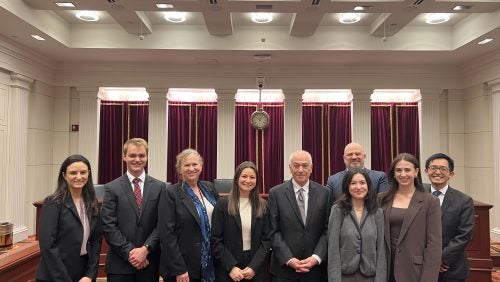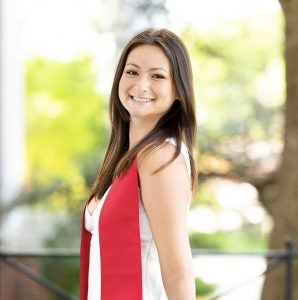First-Year Students Face Judges in 2024 Beaudry Moot Court Competition
April 25, 2024

2024 Beaudry Competition finalists pose with members of the judging panel. L-R: Attorney Zoe Jacoby; Luke Dykowski, L’26; Prof. Laura Donohue; Jen Fridman, L'26; Judge Anthony Trenga; Judge Timothy Kelly, L'97; Allyson Rosenblum, L'26; Talia Paskuski, L’26, and attorney Gregory Cui.
Having beat out some 70 competitors, four finalists faced a panel of real-life judges and practitioners as they made their arguments in the last round of the 73rd annual Robert J. Beaudry Moot Court Competition on April 3. The competition is held each spring and offers first-year students the chance to practice their written and oral advocacy skills — with top performers earning an invitation to join the Appellate Advocacy Division of Georgetown Law’s Barristers’ Council.
After successfully writing briefs and progressing through three prior competition rounds, finalists Allyson Rosenblum, L’26, Talia Paskuski, L’26, Luke Dykowski, L’26, and Jen Fridman, L’26, presented their oral arguments in a case modeled after the 8th United States Circuit case, Molina v. Book, concerning the First Amendment rights of legal observers of public protests.
Along with high-scoring students from earlier rounds, the finalists were invited to join the Barristers’ Council Appellate Advocacy Division, which oversees a moot court team that will participate in 15 interscholastic competitions across the country and internationally this year, including this month’s Price Media Law Moot Court Competition at the University of Oxford and the upcoming International Criminal Court Moot Court Competition in The Hague, Netherlands. The team also competes in Los Angeles, New York and Washington, D.C., where division members won the D.C. Cup Moot Court Competition in February.
Each fall, the Appellate Advocacy Division also holds the Leahy Competition for upper-class students interested in joining the moot court team. This year’s Leahy finalists were Aloke Prabhu, L’25, Grace Campbell, L’25, “Best Oral Advocate” winner Allie Dodson, L’25, and “Best Brief” winner Adrian Schmitt, L’25.
“It was very rewarding to see six weeks worth of planning come to fruition, but no amount of planning can account for the two most important factors: engaged panelists and talented, well-prepared finalists” said John McBride, L’25, co-director of the Beaudry Competition, one of several annual in-house competitions for students interested in becoming a member of the Barristers’ Council, which also oversees trial advocacy and alternative dispute resolution teams. “It’s easy to say that things went well when our finalists were as sharp as these four, and when our judges were prepared to challenge them every step of the way.”
An ‘outstanding performance’
Working in teams of two, each finalist had up to 12 minutes of speaking time to address the judges, who posed tough, on-the-spot questions in the style of Supreme Court Justices. Rosenblum and Paskuski represented the hypothetical petitioner, who was tear gassed by a police officer while observing a public protest, while Dykowski and Fridman represented the respondent, the fictional city where the incident took place.
Playing the role of Chief Justice was Judge Anthony Trenga of the U.S. District Court for the Eastern District of Virginia. Trenga, who also serves as presiding judge for the U.S. Foreign Intelligence Surveillance Court, was joined on the judging panel by Gregory Cui, an attorney with the MacArthur Justice Center’s Supreme Court and Appellate Program; Judge Timothy Kelly, L’97, of the U.S. District Court for the District of Columbia; Zoe Jacoby, an associate at Sullivan & Cromwell and a member of the firm’s Supreme Court and appellate practice and Professor Laura Donohue, director of Georgetown Law’s Center on National Security and faculty director of the Center on Privacy and Technology.
Following the arguments, the judges gave each finalist personalized feedback on all aspects of oral advocacy, from rebuttal strategies to courtroom decorum, and praised their arguments and composure. “Let me congratulate you all for an outstanding performance,” said Trenga to the finalists, before awarding Fridman the title of “Best Oral Advocate.” Also recognized were the competition’s top three brief writers, including Olivia Hale, L’26, who won “Best Brief.”
“To be named Best Oral Advocate is an honor and so encouraging considering this is something I would like to make a career out of,” said Fridman after the competition. A first-generation American and law student, Fridman noted that participating in moot court throughout high school and college motivated her to pursue a law degree.
Fridman also underscored the value of being able to compete for a spot on the Appellate Advocacy Division’s moot court team as a first-year student. “A lot of law schools do not open up the opportunity to join the Appellate Advocacy team until your 2L year,” she said. “Having the opportunity to continue doing moot court in law school as early as I could was very important to me.”
We spoke with Fridman about preparing for the competition, her career aspirations and advice for future moot court participants.

Jen Fridman, L’26, was named “Best Oral Advocate.”
What was it like to deliver your argument in front of the judges?
Delivering the argument was exciting. Time could not have gone by faster, and the questions are always a surprise, but that’s the best part of the whole thing! You never know what’s going to happen when you get up there, but you know you will be fine if you are prepared and stay confident in yourself and what you are arguing for your client.
How did you prepare, particularly for the judges’ questions?
Before every round I practiced with my fellow Section 2 classmates. We would each do a full 12-minute argument with questioning and then receive feedback afterwards. Getting interrupted with questions is exactly the beauty of moot court and appellate advocacy. It is a conversation, not a speech — and it involves an important skill that every aspiring litigator should have, which is being able to react quickly under pressure.
Did any of the judges’ feedback resonate with you?
I appreciate the time each of the five judges took in giving advice to me and my fellow finalists. The comment that particularly stuck with me came from Professor Donahue, who uttered the nine simple words “you are exactly where you are supposed to be.” Even after years of participating in this activity, it can be hard to feel like the courtroom is where you belong. Receiving a comment like this after my first law school moot court competition was truly life-changing for me.
How do you think joining the team will help you in terms of your future career? Are there any competitions you’re excited about?
Joining the team will absolutely help prepare me for what I hope will be a long career in appellate litigation. I am excited about the prospect of competing abroad and gaining additional exposure to complex legal issues outside of the classroom.
What advice would you give other students trying out for moot court teams?
My best advice is to remember that you deserve to take up space, that your voice is worth listening to and that you are more capable than you think. I also recommend practicing your argument with a completely cold bench [meaning the judges aren’t asking any questions] — which you can do on your own — to ensure you have enough to talk about to fill your time (this can also help trigger new ideas about your argument).
I would also highly encourage considering the policy implications of your argument. In this competition, our hypothetical case made it to the Supreme Court! That means that both sides, and the Court, undoubtedly have a big-picture interest in the outcome of the case that likely implicates more than just one specific client.